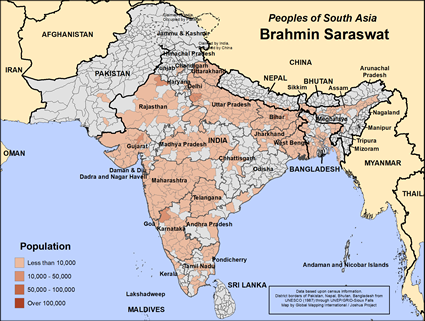Brahmins are the highest of the four varna (major caste groupings) in Hinduism. The historical developments of various Brahmin castes are not clear, as the history of the caste system itself is unclear. There was perhaps a caste system based on personal merit at one time before the hereditary caste system became dominant, as is seen in modern history. Brahmin castes became powerful in the early centuries of the Christian Era through alliances with kings, who granted them landed estates related to temples and temple service. There has never been a comprehensive analysis of all the different types and subgroups of Brahmins.
Traditionally Brahmins have five daily duties; to the gods, to ancestors, to all creatures, to humans, and to study. Thus daily worship (duty to gods) and chanting of sacred texts (duty to study) are an integral part of many Brahmins' lives, even if this is only a token routine for many.
Brahmins are scattered across India and Nepal in dozens of jātis (castes) speaking many different languages. A high percentage of them also speak English as higher education in India is mostly English medium.
Brahmins are disproportionately represented among overseas Hindu groups due to their high educational attainments, so those who reach out to Hindu nationals in the West are very likely reaching out to people who are extremely difficult to reach in South Asia.
Traditionally in the varna system Brahmins are considered as priests, but a temple priest is a lowly position that no Brahmin family wants their sons to aspire towards. Rather, there is strong pressure for higher education, particularly in computer science and engineering. Brahmins have a strong work ethic and are often leaders, whether politically, intellectually, spiritually or socially.
Brahmins are still deeply influenced by the traditional four stages of life; the first student stage is followed by the householder stage, where marriage, raising a family and being a productive member of society is the primary obligation of an individual. Once children are married there is time for spiritual concerns in the third stage of reclusiveness, which is followed (this is rarely practiced) by itinerant homeless wandering (sannyasa).
Often a busy Brahmin will put off spiritual discussions as an issue for later in life. The famous Bhagavad Gita text does not support this, however, as it calls for all humanity to engage in doing good to all without thought of merit or reward for such actions.
In some cases Brahmin subgroups are defined by their theological distinctions. However, many Brahmin castes are made up of people who adhere to all the various philosophical and theological options espoused by modern Hindus, including hard core secularists and atheists. One can never predict what an individual Brahmin might believe or disbelieve!
The Brahmins as an influential and generally well-to-do community are not unlike the middle classes of most places. Their main needs involve relational strains that are usually kept behind closed doors. Modernization is breaking down family units which have been the glue to society for many generations, and loneliness is increasingly a problem. They are expected to "achieve it all," but ironically, achieving it all can be empty.
Pray for Saraswat Brahmin families in Nepal to seek and accept the blessings of Jesus Christ for their families and communities.
Pray for Christ to reveal Himself to Saraswat Brahmin leaders in Nepal who will in turn begin to disciple others to His ways.
Pray for Holy Spirit directed Christ followers to go to Brahmin communities in Nepal.
Pray for a disciple making movement to emerge among every Brahmin community in Nepal.
Scripture Prayers for the Brahmin Saraswat in Nepal.
https://en.wikipedia.org/wiki/Saraswat_Brahmin
https://www.quora.com/What-is-the-history-of-Saraswat-Brahmins
http://creative.sulekha.com/the-saraswat-brahmin-displaced-inhabitant-of-saraswati_112621_blog
https://www.revolvy.com/page/List-of-Saraswat-Brahmins
| Profile Source: Keith Carey |











